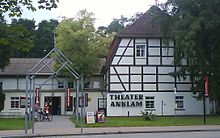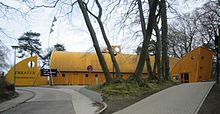Vorpommersche Landesbühne
The Vorpommersche Landesbühne (VLB) is the theater of the city of Anklam and, alongside the Theater Vorpommern in Greifswald and Stralsund, one of two theaters in the Vorpommern part of the state of Mecklenburg-Western Pomerania . Until 1992 the house was under the name of "Theater Anklam" in municipal ownership. In 1993 the name was changed to a GmbH under the new name "Vorpommersche Landesbühne" and the change to the sponsorship of the non-profit association "Vorpommersche Kulturfabrik".
history
Until 1989
On August 28, 1949, the Anklam theater started playing the play "Iphigenie auf Tauris" in the Anklamer Volkshaus, which had been made a makeshift theater hall. In 1951 the final venue was found, a half-timbered building that had been built in 1870 as the Anklamer Schützenhaus and in which theater was already being played in the 1920s.
Although the Anklam theater was only considered to be a C-category theater in the cultural landscape of the GDR , it achieved national fame in the early 1980s. At that time it was considered “the penal colony at the end of the world. Inconvenient directors were sent to Western Pomerania Siberia, where they could not cause any damage. ”In 1981, Frank Castorf became senior director in - as he says in retrospect -“ beautiful brown ('fax makers gas') Anklam. ”He gathered people there who“ normally would not have gone to Anklam, ”said Castorf later. “Suddenly there were people there who were in a lot of trouble, barely got any work, were banned from working, or where there were exit applications, also alcoholics. People who have such an extremely unique handwriting and couldn't get along anywhere else ”. Under Castorf, who was just beginning to alienate classical plays, known as the “piece shattering”, directors such as Herbert König , Gabriele Gysi and Michael Klette staged major theater events for East Berlin's cultural scene that went to the premieres in Anklam. However, these performances hardly corresponded to the interests of the local population, who for the most part came from the industrial and agricultural surroundings of the city of Anklam and its surroundings, and were mostly in opposition to the avant-garde artists and oppositionists exiled to the province. Castorf was accused of staging past the audience and that his productions were "no longer socialist theater".
On the part of the SED culture functionaries in Berlin and the Stasi - "Abwehr officers Art and Culture", attempts were subsequently made to suppress the "alternative theater concept" at the Anklamer Theater by monitoring and interfering with the program. Many ensemble members evaded this pressure and left the GDR. Anklam got the reputation of the "departure theater". Part of the state measures was a change in the artistic director . Wolfgang Bonness left in 1983, Wolfgang Bordel came with official support and took over the role of Frank Castorf's opponent. Bordel, physicist and PhD philosopher, who had come to the stage through the workers' and student theater of the Humboldt University in Berlin , wanted to bring the Anklam population back to the theater. He played folk theater and relied on comedies and crude plays: "I don't care if we are reviewed in Berlin", was and is his motto, "The audience should find it good." Two diametrically opposed views of the theater clashed.
In March 1984, a few weeks before the premiere of the play Drumming in the Night, the main actor Horst Günter Marx was arrested and later the general rehearsal audience was expelled from the theater by the director with the active assistance of some SED officials. During this dispute, Castorf accused Intendant Bordel of playing a “game that had been agreed upon”, and told an official: “50 years ago artists were chased out of theaters”. This was promptly seen as “equating legitimate state rights under socialism with fascism”. Intendant and SED district leadership initiated disciplinary proceedings with the aim of "termination without notice", against which Castorf defended himself at the district court - and was won. Finally he received a “severe reprimand” for offenses against the “socialist work discipline”. That was the beginning of Castorf's end in Anklam. He gave up his post as director, left the theater after a final premiere in February 1985 and moved on with his following.
At that time he allowed himself to be abused, Bordel later admitted, but with the caveat: "Castorf was two floors too avant-garde for Anklam anyway." The expulsion made waves in the cultural scene. As a result, Bordel was exposed to a number of personal attacks. He was accused of vengeance due to a lack of talent and amateurism.
From 1989
With the turnaround in 1989 and the associated changes in the cultural landscape, however, Bordel finally became the “theater savior” in Anklam. In 1991 the Deutsche Bühnenverein had predicted that Theater Anklam would end quickly. Anklam is too small for a theater, the public sector has no money and there is also no classical theater audience here. Bordel did not want to see that and instead expanded: “Perhaps the East cannot be measured so easily according to German criteria”.
In 1993, the Chapeau Rouge theater tent in the Baltic Sea resort of Heringsdorf on the island of Usedom was added as a second summer stage. Four years later , the first Vineta Festival took place on the Baltic stage in Zinnowitz , also on the island of Usedom, and has since been the theater's most successful project with around 20,000 to 25,000 visitors per year. In addition, in 1997, the so-called yellow theater “die sheet metal box” was opened in Zinnowitz. In 1999 , the Vineta Festival, organized by the Vorpommerschen Landesbühne, took place for the first time in the city of Barth . A year later, in April, the Barther Bodden stage , which was built in the former sugar factory in Barth, was opened, which has since supplemented the theater with an additional venue. In October of the same year, the Vorpommern Theater Academy was also founded in Zinnowitz , which has been a higher vocational school for theater work / acting since 2005 .
The annual budget of the theater is around 2.5 million euros. Of the around 50 employees, 15 are permanent actors. In addition, there are about 30 students from the theater academy, called Eleven , who are included in the performances. The number of visitors is around 75,000 to 80,000 per year.
Until his age-related resignation at the end of April 2019, Wolfgang Bordel was one of the longest-serving theater directors in Germany. He was considered the most successful “cultural entrepreneur” in the region. The 68-year-old will stay with the Landesbühne, wants to get involved in the theater's sponsoring association and devote himself to training actors.
Martin Schneider , born in 1983 , has been the new artistic director since May 1, 2019. The trained actor, who comes from Dresden, was previously director of the Barther Boddenbühne , directed and also took on roles there. The Barther open-air stage, which is mainly used in the summer, had previously cooperated closely with actors from the Anklam Theater. Schneider criticized the state government for the fact that the current budget does not allow "fair wages" to be paid. At the same time, he assured that the acting students employed in the theater's productions will receive remuneration.
Venues
- Theater Anklam
- Theater tent “Chapeau Rouge” Heringsdorf
- Ostseebühne Zinnowitz (Vineta Festival)
- "The tin can" Zinnowitz
- Barther Bodden stage
- Barther Hafenbühne (Vineta Festival Barth)
- German Theater Peenemünde (dtp)
- Clubhouse of the Eggesin National People's Army
- Clubhouse of the Karpin National People's Army
- Clubhouse of the Torgelow National People's Army
- Usedom harbor
- Anklam port "Peene is burning"
Ensemble (1980s)
Directors
- Frank Castorf
- Herbert King
- Michael Klette
- Torsten Münchow (as guest)
- Gabriele Gysi (as guest)
- Bernd Peschke (as guest)
- Horst Wünsch (as guest)
- Andreas Kausch
- Herbert Tichy
- Peter Ibrik
actor
- Hendrik Arnst
- Hans-Uwe Bauer (as guest)
- Klaus Breuing (puppeteer)
- Wolf Butter (also composer and stage musician)
- Marie Gruber
- Lutz Harder
- Henry Hübchen (as guest)
- Jörg-Michael Koerbl (as guest)
- Horst Günter Marx
- Kurt Naumann
- Silvia Rieger (as guest)
- Christa Rockstroh
- Rolf Seidel
- Werner Stempel (as guest)
- Ronald Jopt
- Cornelia Kluge
- Petra Solga
- Andreas Kausch
- Gerhard Schönerstedt
- Wolfgang Grossmann
Individual evidence
- ^ Matthias Matussek: The provincial theater in Anklam, GDR. In: Rudolf Augstein (Ed.): A German Decade. Munich 1997, p. 192
- ↑ Castorf 1994, cit. n. Hans-Dieter Schütt : The eroticism of betrayal. Conversations with Frank Castorf. Berlin 1996, p. 124
- ^ Castorf 1991, cit. n. Siegfried Wilzopolski: Theater of the moment. Frank Castorf's theater work. Berlin 1992, p. 13
- ↑ Hans-Dieter Schütt: The eroticism of betrayal. Conversations with Frank Castorf. Berlin 1996, p. 124; Matthias Matussek: The provincial theater in Anklam, GDR. In: Rudolf Augstein (Ed.): A German Decade. Munich 1997, p. 192
- ↑ Siegfried Wilzopolski: Theater of the moment. Frank Castorf's theater work. Berlin 1992, p. 14
- ↑ cit. n. Matthias Matussek: The provincial theater in Anklam, GDR. In: Rudolf Augstein (Ed.): A German Decade. Munich 1997, p. 193
- ^ Matthias Matussek: The provincial theater in Anklam, GDR. In: Rudolf Augstein (Ed.): A German Decade. Munich 1997, p. 192; BStU, BV Nbg KD Anklam No. 3786 (MfS documents "Theater Anklam")
- ↑ BStU, BV Nbg KD Anklam No. 3786
- ↑ "He came with a party order", so: Jens Blankennagel: Spring in Theater Siberia . In: Berliner Zeitung. July 12, 2001 edition; see also article We want sun! (VLB press archive, without source note)
- ↑ a b quot. in: Jens Blankennagel: Spring in Theater Siberia . In: Berliner Zeitung. Edition of July 12, 2001.
- ↑ This is how the dramaturge of the theater Gudrun Wilzopolski describes the incidents: Pathetic power. Memories of “Drumming in the Night” (1984/1992), in: Siegfried Wilzopolski: Theater of the Moment. Frank Castorf's theater work. Berlin 1992, pp. 75-78
- ↑ Minutes of the Anklam Theater Conflict Commission of August 1984, extracts. printed in: Siegfried Wilzopolski: Theater of the Moment. Frank Castorf's theater work. Berlin 1992, p. 81ff., Citations p. 82
- ↑ Claudia Sieling: But don't say anything against Anklam (excerpts), in: Siegfried Wilzopolski: Theater of the moment. Frank Castorf's theater work. Berlin 1992, p. 81
- ↑ quoted in: Tom Mustroph: Quel Bordel. In: Friday. Edition 35/2001.
- ↑ a b Schneider new director at the Anklamer Theater , NDR, published and accessed on 2nd April 2019
- ↑ New director in Anklam: Secure Theater in Rural Areas , nachtkritik.de, published and accessed May 2, 2019
swell
- literature
- Jens Blankennagel: Spring in Theater Siberia . In: Berliner Zeitung. Edition of July 12, 2001
- German stage yearbook. 2001
- Matthias Matussek : The provincial theater in Anklam, GDR. In: Rudolf Augstein (Ed.): A German Decade. Munich 1997, pp. 191-203
- Tom Mustroph: Quel Bordel. In: Friday. Edition 35/2001
- Dietrich Pätzold: Theater as an attempt to fly. In: Ostsee-Zeitung. Issued February 25, 2004
- Hans-Dieter Schütt: The eroticism of betrayal. Conversations with Frank Castorf. Berlin 1996, ISBN 3-32-001916-3
- Siegfried Wilzopolski: Theater of the moment. Frank Castorf's theater work. Berlin 1992
- Film / television
- Quiet land. Feature film 1992, director: Andreas Dresen , shot at Theater Anklam; the film portrays the turning point fictionally, but with clear references to reality. Intendant Bordel can be seen as a canteen host
- Theater landscapes: Vorpommersche Landesbühne Anklam. Report by the TV station 3sat, 2004, directed by Matthias Schmidt
Web links
Coordinates: 53 ° 51 ′ 5.9 ″ N , 13 ° 40 ′ 40.6 ″ E

